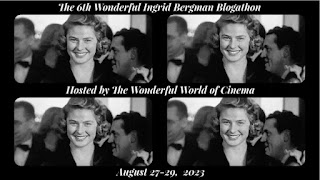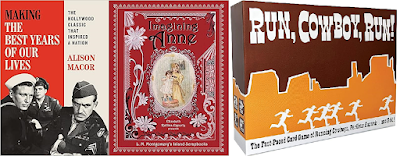Anna (Ingrid Bergman) is a famous and popular actress on the London stage. She's also suddenly single again, having broken up with her latest boyfriend and come home to her London apartment to be alone and get over him. Not expecting company, she nibbles a snack and puts cold cream all over her face. Her sister Margaret (Phyllis Calvert) and brother-in-law Alfred (Cecil Parker) stop by to change clothes before going to an important dinner -- they don't live in London and often use Anna's flat to change, whether she is there or not.
Unexpectedly, at least to Anna, a dapper banker named Philip (Cary Grant) stops by too. He's to be the speaker at the dinner that Alfred and Margaret are attending, and they are escorting him there, or something.
Although Anna has cold cream all over her face when he first sees her, thus rendering her hideous by Hollywood standards, Philip is obviously enchanted by her.
At the end of the evening, Anna invites Philip back to her apartment for a nighcap.
Random side note: I really love Anna's apartment, and have long dreamed of doing a similar thing with colored mattes around cool sketches reaching up to the ceiling. I haven't ever lived anywhere that this would work, but I still think it is super nifty.
Anna and Philip are obviously attracted to each other, and they know it. But Philip drops a bomb in the middle of their flirtatious shared drink: he is married, and he can't possibly get a divorce.
Another side note: I have a particular fondness for the way that Cary Grant says the word "divorce." He says "dee-vorce," and it's cute and different and funny, and I like it.
Philip makes a graceful exit, having made it clear that if he embarked on a relationship with Anna, it could never end in marriage, it could only be temporary. Anna decides she doesn't care and invites him to go to the ballet with her the next evening. Instead of going to the ballet, they wander around London with Anna's chauffeur Carl (David Kossoff) following them discreetly in Anna's car.
By the end of the evening, Anna and Philip have come to an unspoken agreement. They will see each other romantically, they will commit adultery together, they will be... indiscreet, basically. And, while I am wholeheartedly opposed to adultery, I can't help but love the way the filmmakers handle this. Because we don't have any dialog about it. We don't have any scenes of the two characters sharing a bed. We don't even have very many kissing scenes. It is 100% closed-door, in modern parlance, including a moment when the pair go into Anna's apartment and literally close the door on the camera, and that is all we have to know. We, the audience, know what they're intending to do together, but we never have to see it, or start to imagine it. We just merrily go forward, seeing what happens to two people who fall in love when they know they morally should not.
We get a couple of cute scenes of Philip and Anna talking on the phone from their respective abodes, and you might say this is copying Pillow Talk (1959), except that Indiscreet was released a year before that Doris Day romp.
Philip and Anna give each other gifts, go to parties together, spend cozy evenings together, go shopping together -- but always, there's that lingering sense that they could be having an even better time if they didn't have the simple fact hanging over their heads that Philip has a wife somewhere.
This shot is really only here to add to my growing collection of unusual ways to stage kisses.
Well. We get two-thirds of the way through the movie, all glamor and romance and lovely accents... and then another bomb drops. This is a very big bomb, the kind that causes a paradigm shift. I am going to SPOIL it here, quite thoroughly, so if you don't want spoilage, please STOP reading here and drop down to under the picture that says "THE END."
Can't say I didn't warn you.
The second bomb is this: Philip is not married. He has never been married. He just lies and tells people that he's married so that his paramours never try to get him to marry them. He's a serial monogamist who pretends to be a serial bigamist.
This paradigm shift makes Anna -- and the audience -- reevaluate everything Philip has said and done. And the hilarious thing is, it makes Anna feel more immoral than when she thought she was committing adultery with him. As long as she believed Philip was being honest with her, she didn't mind being an adulteress. But now that she's discovered she's just a common fornicator who's been lied to, she is furious. Livid, even. How dare he deceive her?
And this is what makes me love this movie. It points out the absolute absurdity of assuming that one form of sexual relationship outside of marriage is any worse than any other. And it points out all the problems that result from going to bed with someone you're not married to, whether or not either of you are married to someone else.
Also, it's handled in a super funny way, with lots of sharp, witty dialog.
Deceit piles up on top of deceit until both Anna and Philip are going in circles trying to figure out what's true. And, of course, everything smooths out in the end, and they wind up deciding to get married to each other. One hopes they have also learned the vital importance of being honest with each other too.
END of SPOILERS! It's safe to read again.
Is this movie family friendly? Weirdly, yes. Like I said, aside from some kissing, there's no real sexual content here. No cussing, no violence. Kids probably won't find it funny, and won't fully understand what's going on, but it's not a dirty movie in any way. Does have one shouted cuss word, but said with Bergman's accent, so it's not necessarily obviously a cuss word.
This review is my contribution to the 6th Wonderful Ingrid Bergman Blogathon hosted by the Wonderful World of Cinema in honor of Bergman's birthday this week.

























